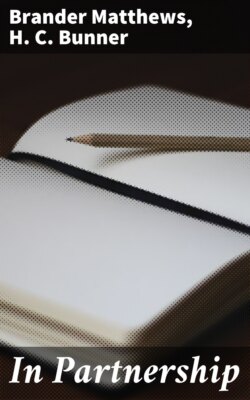Читать книгу In Partnership - Brander Matthews - Страница 15
На сайте Литреса книга снята с продажи.
Document No. 10.
ОглавлениеLetter from the late John Phœnix, found among the posthumous papers of the late John P. Squibob, and promptly published in the “San Diego Herald.”
Off the Coast of Florida, Jan. 3, 1849.
My Dear Squib:—I imagine your pathetic inquiry as to my whereabouts—pathetic, not to say hypothetic—for I am now where I cannot hear the dulcet strains of your voice. I am on board ship. I am half seas over. I am bound for California by way of the Isthmus. I am going for the gold, my boy, the gold. In the mean time I am lying around loose on the deck of this magnificent vessel, the Mercy G. Tarbox, of Nantucket, bred by Noah’s Ark out of Pilot-boat, dam by Mudscow out of Raging Canawl. The Mercy G. Tarbox is one of the best boats of Nantucket, and Captain Clearstarch is one of the best captains all along shore—although, friend Squibob, I feel sure that you are about to observe that a captain with a name like that would give anyone the blues. But don’t do it, Squib! Spare me this once.
But as a matter of fact this ultramarine joke of yours is about east. It was blue on the Mercy G.—mighty blue, too. And it needed the inspiring hope of the gold I was soon to pick up in nuggets to stiffen my backbone to a respectable degree of rigidity. I was about ready to wilt. But I discovered two Englishmen on board, and now I get along all right. We have formed a little temperance society—just we three, you know—to see if we cannot, by a course of sampling and severe study, discover which of the captain’s liquors is most dangerous, so that we can take the pledge not to touch it. One of them is a chemist or a metallurgist, or something scientific. The other is a gentleman.
The chemist or metallurgist or something scientific is Professor Titus Peebles, who is going out to prospect for gold. He feels sure that his professional training will give him the inside track in the gulches and gold mines. He is a smart chap. He invented the celebrated “William Riley Baking Powder”—bound to rise up every time.
And here I must tell you a little circumstance. As I was coming down to the dock in New York, to go aboard the Mercy G., a small boy was walloping a boy still smaller; so I made peace, and walloped them both. And then they both began heaving rocks at me—one of which I caught dexterously in the dexter hand. Yesterday, as I was pacing the deck with the professor, I put my hand in my pocket and found this stone. So I asked the professor what it was.
He looked at it and said it was gneiss.
“Is it?” said I. “Well, if a small but energetic youth had taken you on the back of the head with it, you would not think it so nice!”
And then, O Squib, he set out to explain that he meant “gneiss,” not “nice!” The ignorance of these English about a joke is really wonderful. It is easy to see that they have never been brought up on them. But perhaps there was some excuse for the professor that day, for he was the president pro tem. of our projected temperance society, and as such he had been making a quantitative and qualitative analysis of another kind of quartz.
So much for the chemist or metallurgist or something scientific. The gentleman and I get on better. His name is Beaver, which he persists in spelling Beauvoir. Ridiculous, isn’t it? How easy it is to see that the English have never had the advantage of a good common-school education—so few of them can spell. Here’s a man don’t know how to spell his own name. And this shows how the race over there on the little island is degenerating. It was not so in other days. Shakspere, for instance, not only knew how to spell his own name, but—and this is another proof of his superiority to his contemporaries—he could spell it in half a dozen different ways.
This Beaver is a clever fellow, and we get on first rate together. He is going to California for gold—like the rest of us. But I think he has had his share—and spent it. At any rate he has not much now. I have been teaching him poker, and I am afraid he won’t have any soon. I have an idea he has been going pretty fast—and mostly down hill. But he has his good points. He is a gentleman all through, as you can see. Yes, friend Squibob, even you could see right through him. We are all going to California together, and I wonder which one of the three will turn up trumps first—Beaver, or the chemist, metallurgist or something scientific, or
Yours respectfully, John Phœnix.
P. S.—You think this a stupid letter, perhaps, and not interesting. Just reflect on my surroundings. Besides, the interest will accumulate a good while before you get the missive. And I don’t know how you ever are to get it, for there is no post-office near here, and on the Isthmus the mails are as uncertain as the females are everywhere. (I am informed that there is no postage on old jokes—so I let that stand.)
J. P.
